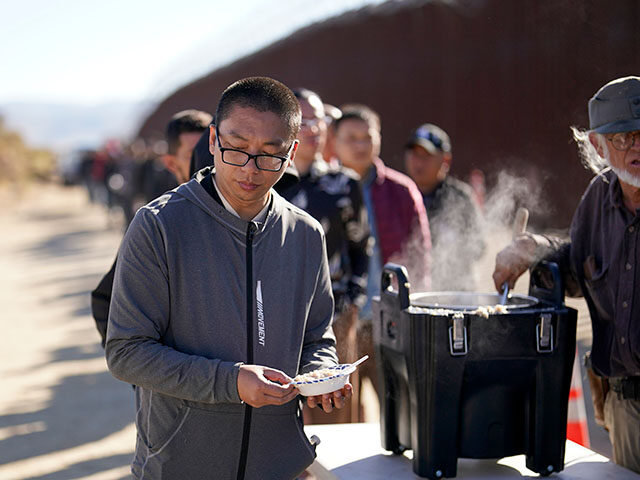The government of Ecuador will soon reinstate entry visa requirements for Chinese nationals after authorities documented a “worrying” increase in illegal immigration by Chinese citizens, many of whom then leave for other countries in the region, including the United States.
The “temporary” measure, which will go into effect on July 1, will suspend a visa waiver agreement signed in January 2015 during the pro-China administration of former socialist president Rafael Correa. The deal, which went into effect in August 2016, allows Chinese nationals to enter Ecuador and visit the country for a period of up to 90 days without the need for a visa.
Ecuador and Suriname are currently the only two South American countries that do not impose any kind of entry visa requirements on Chinese citizens. Bolivia requires bearers of Chinese passports to request a visa upon arrival.
Since 2022, Ecuadorian authorities have tallied growing numbers of Chinese nationals entering their country. In 2023, the Ecuadorian government registered the entry of 66,189 Chinese nationals, only 34,209 of whom left within the terms of the visa waiver agreement.
The Ecuadorian Foreign Ministry made the announcement in a statement published on Tuesday, explaining that the upcoming visa waiver suspension is due to the “unusual increase in irregular migratory flows” of Chinese nationals who arrive in Ecuador and either do not leave Ecuador within the 90-day visa waiver period or use Ecuador as a “starting point to reach other destinations in the Hemisphere.”
“In recent months, there has been a worrying increase in migratory flows from China and, additionally, approximately 50 percent of these entries have not left through regular routes and within the times established by law,” the statement read. “For this reason, they would be in the country in an irregular immigration situation or would have left through irregular routes to other destinations in the Hemisphere.”
The Ecuadorian Foreign Ministry concluded its statement by reiterating its commitment that “people who visit the country can do so with adequate security guarantees, preventing them from being victims of human trafficking or migrant smuggling, as well as ensuring adequate national immigration control and precautions for the normal operation of air transport companies.”
Chinese Foreign Ministry spokesman Lin Jian responded to the change during his regular press briefing on Tuesday, claiming that since the agreement went into effect in August 2016 it has “played an important and positive role in promoting cross-border travel and practical cooperation in various fields between the two countries.”
Lin continued:
The Chinese government firmly opposes all forms of human smuggling. In recent years, Chinese law enforcement departments have made tremendous efforts to fight crimes that involve obstructing national frontier and border administration, and remained tough on all kinds of human smuggling groups and individuals engaged in illegal immigration. Their effort has produced good results. At the same time, Chinese law enforcement departments are working with relevant countries to jointly tackle human smuggling activities, repatriate illegal immigrants and maintain a good order in cross-border travel.
The Chinese spokesman reiterated the “importance” of the visa waiver agreement with Ecuador the next day.
Reports published in May indicated that Chinese citizens seeking to claim asylum in the United States are using Ecuador’s visa waiver agreement to reach South America by taking flights from Turkey or Ethiopia.
Many of the Chinese citizens have arranged their journey to Ecuador — and ultimately the United States — under guidance from videos published on the Chinese-owned TikTok social media platform, where offers for “safe travel” packages can reportedly be found as well.
The U.S-bound Chinese nationals eventually pass through the dangerous Darién Gap jungle trail located between Colombia and Panama. Upon reaching the U.S. southern border, the Chinese nationals allegedly request asylum to American authorities under grounds of persecution by the Chinese communist regime led by dictator Xi Jinping.

Haitian migrants wade through a river as they cross the Darien Gap, from Colombia into Panama, hoping to reach the U.S., Oct. 15, 2022. (Fernando Vergara, File/AP)
“Upon arrival in the United States, many Chinese migrants seek asylum and integrate into established Chinese communities, where they find support and resources,” the Argentine news outlet Infobae reported in May. “Despite mixed views within these pre-existing communities, the approval rate of asylum applications for Chinese nationals is quite high.”
Chinese citizens who use the visa waiver to arrive in Ecuador but do not seek to reach the United States by passing through the Darién Gap, the reports stated, either chose to overstay their 90-day waiver period and establish businesses in the country or opt to hire human traffickers to smuggle them into U.S. territory.
Christian K. Caruzo is a Venezuelan writer and documents life under socialism. You can follow him on Twitter here.

COMMENTS
Please let us know if you're having issues with commenting.